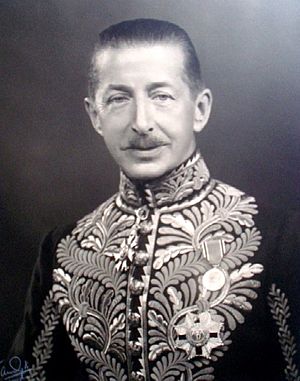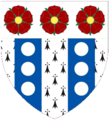William Seeds facts for kids
Quick facts for kids
Sir William Seeds
|
|
|---|---|
 |
|
| Ambassador to the Soviet Union | |
| In office 1939–1940 |
|
| Monarch | George VI |
| Preceded by | Viscount Chilston |
| Succeeded by | Sir Stafford Cripps |
| Personal details | |
| Born | 27 June 1882 Dublin |
| Died | 2 November 1973 (aged 91) London |
| Nationality | British |
| Spouses | Arabella, Lady Seeds (d.1979) |
| Alma mater | Rugby School |
Sir William Seeds (born June 27, 1882 – died November 2, 1973) was an important British diplomat. He worked as an ambassador for the United Kingdom in several countries, including the Soviet Union and Brazil.
Contents
Early Life and Schooling
William Seeds was born in Dublin, Ireland, on June 27, 1882. His family was Ulster Protestant. His father, Robert Seeds, was a lawyer. His mother was Ada Charlotte. After his father passed away, his mother married Sir William Squire Barker Kaye.
William went to Rugby School, a well-known school in England. He was very good at languages. He could speak French, German, Spanish, Portuguese, and Russian. When he was a teenager, he lived in Russia for two years. He stayed with Russian families to learn about their culture and language. He really loved the traditional Russian way of life.
Becoming a Diplomat
William Seeds joined the British Diplomatic Service in 1904. This meant he would represent his country in other parts of the world. His first jobs took him to many different places.
Working Around the World
He worked in Washington D.C., United States, from 1904 to 1907. Then he went to Peking, China, from 1908 to 1910. After that, he served in Athens, Greece, from 1911 to 1913.
From 1913 to 1919, he was in Lisbon, Portugal. He then worked in Berlin, Germany, in 1919. In 1920, he became the Consul General for Bavaria and moved to Munich.
Reporting on the Nazi Party
In 1922, William Seeds attended a meeting in Munich. He wrote one of the first official British reports about the Nazi Party. He described Adolf Hitler as "a rabid Nationalist and anti-Semite." This means Hitler was extremely nationalistic and hated Jewish people. Seeds warned that Hitler was becoming a very serious and dangerous leader.
Ambassador Roles
Seeds continued his diplomatic career in South America. He was an ambassador to Colombia from 1923 to 1925. Then he served in Venezuela from 1925 to 1926.
From 1926 to 1928, he was an ambassador to the Albanian Republic. He reported on the country's leader, Zog I of Albania.
In 1928, Seeds became the British High Commissioner for the Rhineland in Germany. His main job there was to help arrange for troops to leave the area. In 1930, King George V made him a Knight Commander of the Order of St Michael and St George (KCMG). This was a special honor for his work.
Sir William then served as Ambassador to Brazil from 1930 to 1935.
Ambassador to the Soviet Union
His last and most important job was as Ambassador to the Soviet Union from 1939 to 1940. During this time, he tried to make an agreement between the United Kingdom and the Soviet Union. This agreement was meant to help keep peace before World War II. However, the Soviet Union instead signed a different agreement with Nazi Germany, called the Molotov–Ribbentrop Pact.
William Seeds was known for being a charming and intelligent person.
Family Life
On November 17, 1911, William Seeds married Arabella Agnes Muriel. They had three sons and one daughter.
Their oldest son, Robert, was born in 1914. He became a Major in the Intelligence Corps (United Kingdom) during the war. He later became a university professor and journalist.
Their second son, Hugh, was born in 1917. He joined the Royal Navy but later became a conscientious objector. He moved to New Zealand after the war.
Their youngest son, James, was born in 1919. He was a Pilot Officer in the Royal Air Force. Sadly, he was killed in action when he was only 20 years old.
Their daughter, Sheila, was born in 1912. She worked for MI5, a British intelligence agency, during the war. She had two sons who later became baronets.
Later Years and Legacy
Sir William Seeds passed away peacefully at his home in St. John's Wood, London, on November 2, 1973. He was 91 years old. He was buried in his family's graveyard in Derriaghy, Northern Ireland. There is also a memorial for him and his wife at Lymington Church in Hampshire.
Seeds loved collecting art from China and Russia. He gave a special gold and diamond box made by Carl Fabergé to the Victoria and Albert Museum in London. He also planned to give his collection of 10 Fabergé stone figures, which he called "my little men," to the museum.
His personal papers, diaries, and photographs are kept by his granddaughter, Corinna Seeds, in Greece. People can look at them if they want to learn more about his life.
Images for kids
 | Selma Burke |
 | Pauline Powell Burns |
 | Frederick J. Brown |
 | Robert Blackburn |


